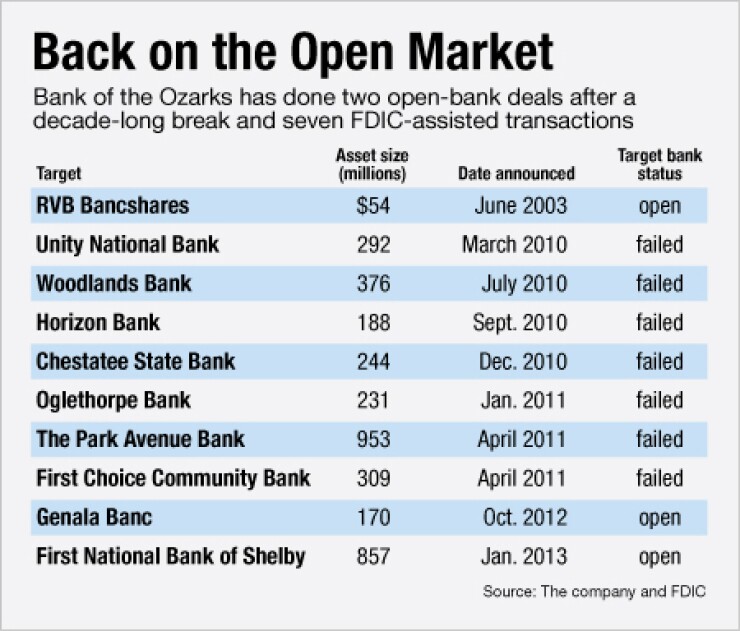-
Bank of the Ozarks in Little Rock, Ark., is raising its profile in North Carolina. The $4 billion-asset company announced Friday it is buying The First National Bank of Shelby in Shelby, N.C., for roughly $67.8 million in cash and stock.
January 25 -
Lured by growth opportunities and low M&A prices, mid-cap banks in neighboring states are pushing deeper into the failure-ravaged Southeast and remapping the region's competitive landscape.
August 1

George Gleason of Bank of the Ozarks called his last deal a dress rehearsal for open-bank transactions. It is now opening night — for him and perhaps other buyers.
The Little Rock, Ark., company (OZRK) announced late Thursday it had
The bank plans more engagements, says Gleason, its chairman and CEO.
"We have ample capital to do a lot of transactions if we can find the good ones. …We continue to look at transactions across a broad spectrum of sizes," he says.
The moves are a good sign for dealmaking this year, observers say.
"We are going to see more deals with stressed banks on the smaller side," says Matt Olney, a research analyst at the investment bank Stephens Inc. "I'm hopeful we'll see similar types of deals throughout the Southeast this year. Bank of the Ozarks clearly used their currency to their advantage to convince the seller to take some stock so that they could enter this market."
The deal, which is expected to close in the second or third quarter, is priced at 67% of First National Bank's tangible book value and the terms of the transaction call for at least 51% of the consideration to be paid in stock. Bank of the Ozarks' stock trades at 2.5 times its book value, which gives First National Bank's shareholders considerable upside potential. The banking industry average is closer to 1.5 times book value, Olney says.
"It not only a good deal for our shareholders, but it is one for theirs, too," Gleason says. "The long-term history of our stock and its desirability, I think, was a significant factor in their board's decision to do the transaction. This is the kind of transaction I like to do — where it is good for us and for them."
Shares of Bank of the Ozarks traded late Friday at $36.91, up 1.12%.
Gleason talked about his company's open-bank ambitions during his company's quarterly conference call on Jan. 17. Similarly, serial failed-bank acquirer
It is another positive sign for dealmaking when buyers are doing more than just talking about their plans, observers say.
"There is a lot of interest and activity in M&A and particularly in the last two weeks, and I think it is going to result in a lot of activity this year," says Byron Richardson, a senior consultant at Bank Resource, an Atlanta advisory firm. "In the public markets the buyers have seen a run-up in value, and from the earnings that have been posted it appears that the industry as a whole had a good year last year."
Gleason declined to say whether he bid against others for First National, but the seller was working with Sandler O'Neill, and Gleason has long identified North Carolina as a growth market.
Bank of the Ozarks has had a loan production office in Charlotte for 11 years, and it has a branch in Wilmington that it acquired as part of failed-bank deal. The Charlotte office is set to become a full-scale branch this year.
"It is well known in the investment banking community that for almost a decade we've had an interest in expanding in North Carolina," Gleason says.
He also declined to say how many deals he had pursued in North Carolina before First National, but said the pricing in the middle part of the last decade had cooled his interest in M&A overall.
"From 2004 to 2009, we looked at a handful of transactions and bid, but we never could find a transaction that was worth what it took to get it," Gleason says.





